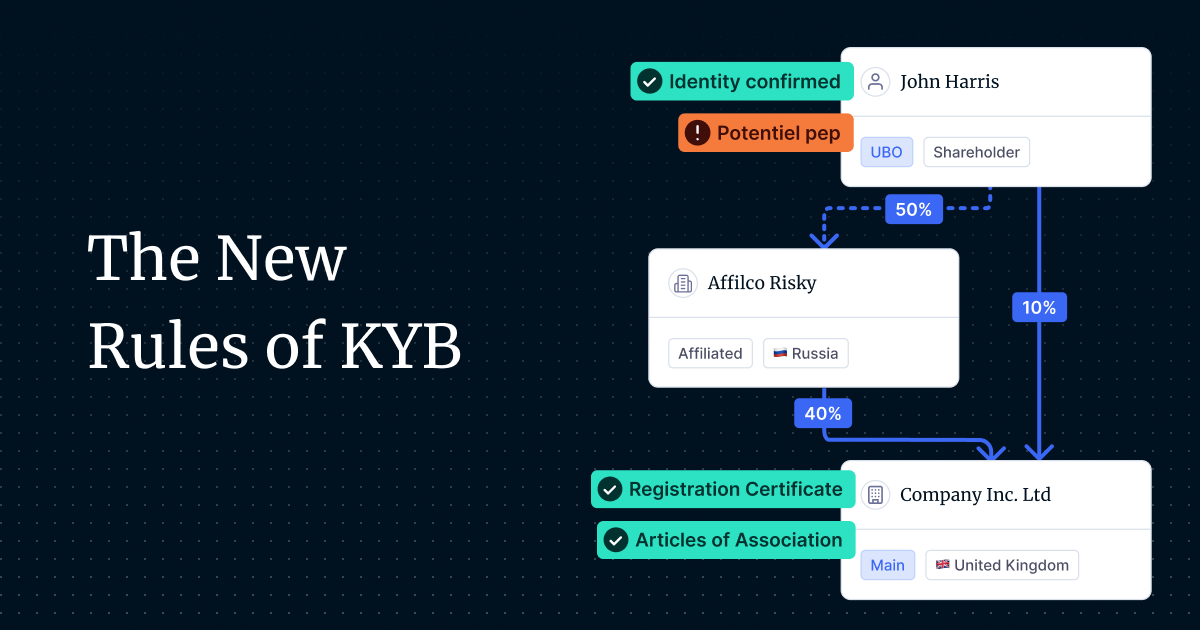The KYB process has evolved beyond basic regulatory compliance into a critical risk management framework. As financial crime grows more sophisticated, implementing a robust end-to-end KYB strategy has become essential for protecting your business against fraud, money laundering, and reputational damage. Let's examine how a comprehensive KYB approach can strengthen your compliance operations.
What is the KYB Process?
The KYB process involves verification of a business entity's identity, ownership structure, and risk profile. Unlike individual verification (KYC), business verification requires analysing complex corporate structures, identifying ultimate beneficial owners (UBOs), and assessing a range of risk factors. A properly implemented KYB process not only ensures regulatory compliance but also protects against financial crime and establishes a foundation for trusted business relationships.
According to the Financial Action Task Force (FATF), the global money laundering and terrorist financing watchdog, effective business verification is a cornerstone of a strong financial crime prevention framework.
What is the end-to-end KYB process?
The end-to-end KYB process aims to understand and verify the business entities with which an organization interacts. Unlike a traditional KYB process, which may focus on surface-level due diligence, the end-to-end KYB process spans the entire lifecycle of a business relationship. It involves thorough checks and assessments from onboarding through ongoing monitoring, and even to the termination of the relationship.
Core Phases of the KYB Process
A comprehensive KYB workflow typically consists of three main phases:
- Business verification and documentation
- Beneficial ownership identification and verification
- Risk assessment and ongoing monitoring
Let’s take a closer look at each phase, analysing practical steps for implementation.
Phase 1: Business Verification and Documentation
Step 1: Collect Basic Business Information
Essential information to gather:
- Legal business name and any trading names
- Registration number and jurisdiction of incorporation
- Legal entity type (corporation, LLC, partnership)
- Business address and operational locations
- Nature of business and industry classification
- Contact details for authorised representatives
Implementation approach: Create standardised data collection forms that capture all required information efficiently. Where possible, pre-populate fields using business registry APIs to reduce customer friction and improve data accuracy.
Step 2: Verify Business Existence and Status
Key verification sources:
- Official company registries (Companies House in the UK, Secretary of State registries in the US, etc.)
- Business licensing databases
- Tax identification verification systems
- Industry-specific regulatory registers
Verification tasks:
- Confirm the business is properly registered and in good standing
- Verify registration dates align with the provided information
- Check for discrepancies in addresses or business names
- Ensure required licences and permits are valid
Practical tip: Maintain a database of trusted verification sources for each jurisdiction where you operate. This reduces research time and ensures consistency in your verification process.
Step 3: Collect and Authenticate Documentation
Essential documents:
- Certificate of incorporation or equivalent registration document
- Articles of association or operating agreement
- Proof of business address (utility bills, lease agreements)
- Financial statements or tax returns (for higher-risk relationships)
- Organisational chart showing corporate structure
Authentication methods:
- Check for official seals, watermarks, and security features
- Verify documents against information in public registries
- Use digital document verification technology for forgery detection
- Request certified copies for high-risk cases
Efficiency insight: Develop a document verification checklist specific to each jurisdiction and entity type to ensure thoroughness and consistency in your review process.
Phase 2: Beneficial Ownership Identification and Verification
Step 4: Identify Ultimate Beneficial Owners
Who qualifies as a UBO:
- Individuals who ultimately own or control 25% or more of the business (threshold varies by jurisdiction)
- Individuals with significant voting rights or control over management
- Senior managing officials, when ownership cannot be determined
As defined by FinCEN's Customer Due Diligence (CDD) Final Rule, financial institutions must identify and verify the identity of beneficial owners who own 25% or more of a legal entity, as well as an individual who controls the legal entity.
Identification methods:
- Review shareholder registers and ownership documentation
- Analyse corporate structure diagrams
- Request self-declaration forms from the business
- Trace ownership through multiple layers of corporate entities
Best practice: Create a visual mapping tool to document complex ownership structures, making it easier to identify control relationships that might not be immediately apparent.
Step 5: Verify UBO Identities
Verification requirements:
- Government-issued identification documents
- Proof of address
- Date of birth verification
- Nationality and residency status
Verification actions:
- Apply standard KYC procedures to each identified UBO
- Conduct identity verification using documentary or electronic methods
- Perform face matching for remote onboarding scenarios
- Verify address through utility bills or bank statements
Risk-based approach: Implement a tiered verification system, applying enhanced measures for UBOs from high-risk jurisdictions or industries.
Step 6: Screen Against Watchlists and Adverse Media
Screening sources:
- Sanctions lists (OFAC, EU, UN)
- Politically Exposed Persons (PEP) databases
- Law enforcement and regulatory watchlists
- Adverse media reports and negative news
Screening actions:
- Screen the business entity against relevant sanctions lists
- Screen all identified UBOs and key executives against sanctions and PEP lists
- For higher-risk relationships or as part of Enhanced Due Diligence (EDD), conduct adverse media searches in relevant languages
- Document all screening results, including false positives
Risk-based screening approach: Apply adverse media screening based on the entity's risk profile. While sanctions screening is mandatory for all entities, comprehensive adverse media screening is typically required for higher-risk relationships and may be more targeted or limited for standard-risk customers.
Automation insight: Utilise screening tools with fuzzy matching capabilities to identify potential matches despite variations in name spelling or formatting.
Phase 3: Risk Assessment and Ongoing Monitoring
Step 7: Conduct Comprehensive Risk Assessment
Risk factors to consider:
- Jurisdiction risk (incorporation location, operational locations)
- Industry risk (vulnerability to money laundering or fraud)
- Product or service risk (complexity, regulatory oversight)
- Relationship risk (transaction volumes, payment methods)
- Structural risk (complexity of ownership, offshore connections)
Risk assessment actions:
- Assign risk scores based on predefined criteria
- Document risk assessment methodology and results
- Determine the appropriate level of due diligence based on the risk profile
- Establish approval processes for higher-risk relationships
Practical approach: Develop a risk matrix that weights different factors according to your business context and regulatory environment.
Step 8: Make an Informed Onboarding Decision
Decision framework:
- Low-risk: Standard approval process
- Medium-risk: Additional verification or senior approval required
- High-risk: Enhanced due diligence and executive approval
- Prohibited: Relationship declined based on risk factors
Decision documentation:
- Record the basis for approval or rejection
- Document any conditions or restrictions placed on the relationship
- Maintain an audit trail of the decision-making process
- Communicate the decision to relevant stakeholders
Governance tip: Create clear escalation pathways for cases that fall into grey areas, ensuring consistent decision-making.
Step 9: Implement Systematic Ongoing Monitoring
Monitoring activities:
- Periodic review of business information and documentation
- Transaction monitoring for unusual patterns
- Adverse media monitoring for emerging risks
- Watchlist screening for changes in status
- Verification of ownership changes
Risk-based monitoring approach: The frequency of reviews should be determined by the risk profile of the business relationship. Higher-risk customers require more frequent monitoring than lower-risk ones, with review intervals established according to your firm's risk assessment methodology and regulatory requirements. Additionally, certain events such as ownership changes, unusual transactions, or adverse news should trigger immediate reviews regardless of the regular schedule.
Efficiency approach: Implement automated monitoring systems that flag changes in risk factors or trigger reviews based on specific events, such as ownership changes or adverse media mentions.
Building an Efficient KYB Workflow
Technology Integration
A modern KYB process leverages technology at various stages:
- Data Collection: Customer portals and digital forms streamline information gathering
- Verification: API connections to registries enable real-time verification
- Screening: Automated screening tools reduce manual effort and increase accuracy
- Risk Assessment: AI-powered scoring systems provide consistent risk evaluation
- Monitoring: Automated alerts flag changes requiring attention
Implementation consideration: Prioritise integration capabilities when selecting KYB tools, ensuring they can connect with your existing systems and data sources.
Process Optimisation
Even with advanced technology, process design remains crucial:
- Clear Ownership: Assign responsibility for each step in the KYB process
- Standardised Procedures: Develop detailed procedures for handling different scenarios
- Quality Controls: Implement review mechanisms to ensure accuracy
- Efficiency Metrics: Track key performance indicators like time-to-decision
- Customer Experience: Design the process to minimise friction while maintaining compliance
Continuous improvement: Regularly review and refine your KYB workflow, seeking input from both compliance teams and business customers.
Common KYB Process Challenges and Solutions
Challenge 1: Complex Corporate Structures
Solution: Develop expertise in analysing corporate hierarchies and implement visual mapping tools to clarify ownership structures. Establish clear procedures for handling multi-layered entities.
Challenge 2: Cross-Border Verification
Solution: Maintain a database of jurisdiction-specific requirements and verification sources. Partner with specialised providers for regions where direct verification is challenging.
Challenge 3: Balancing Security and User Experience
Solution: Implement a risk-based approach that applies more stringent measures only where warranted. Utilise technology to automate routine verifications while focusing human review on complex cases.
Challenge 4: Keeping Information Current
Solution: Establish clear triggers for information updates, including both time-based reviews and event-based reassessments. Implement automated monitoring systems to flag changes requiring attention.
KYB Process Checklist
Use this checklist to ensure your KYB process covers all essential elements:
- Standardised business information collection process
- Access to reliable verification sources for all relevant jurisdictions
- Clear procedures for UBO identification and verification
- Comprehensive screening against relevant watchlists
- Documented risk assessment methodology
- Defined decision-making and approval processes
- Structured ongoing monitoring programme
- Technology support for automation and efficiency
- Training programme for staff involved in KYB processes
- Quality assurance and audit procedures
- A record-keeping system that meets regulatory requirements
For more detailed guidance on regulatory requirements, refer to the Federal Financial Institutions Examination Council (FFIEC) Bank Secrecy Act/Anti-Money Laundering Examination Manual, which provides comprehensive information on customer due diligence requirements.
How can Dotfile help you with the end-to-end KYB process?
Dotfile is an end-to-end business verification platform that enables automating KYB and AML procedures, reducing fraud, and streamlining operations. With data on 400M+ businesses and 3000 document types supported, expanding into a new market while complying with local regulations is a breeze. We help businesses find key information, identify important stakeholders to verify, send questionnaires, run AML checks, and perform risk assessments - all from a single platform. By automating data collection and verification processes, businesses can provide a seamless and instant account opening, boosting customer satisfaction.
Conclusion
A robust KYB process is essential for protecting your organisation from financial crime risks while meeting regulatory obligations. By implementing a structured approach that combines thorough verification with efficient workflows, you can transform compliance from a burden into a competitive advantage.
The most effective KYB processes balance thoroughness with efficiency, applying appropriate scrutiny based on risk while minimising unnecessary friction. With the right combination of technology, expertise, and process design, organisations can build KYB workflows that protect against risk without impeding legitimate business relationships.
As regulatory expectations continue to evolve, maintaining a flexible, risk-based KYB process will become increasingly important. Organisations that invest in developing strong KYB capabilities now will be better positioned to adapt to changing requirements while protecting themselves from the growing threats of financial crime and reputational damage.





.png)
